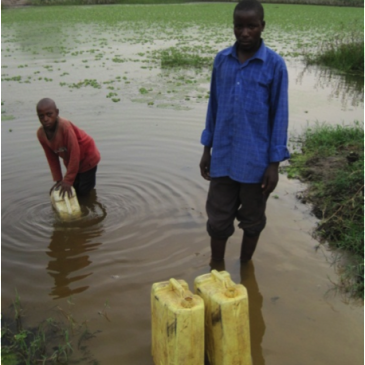Secure safe water in Uganda’s changing climate

Introduction
Uganda’s future climate is uncertain and could see further weather extremes. The CDKN film Secure safe water in Uganda’s changing climate explores how precious freshwater resources could be better managed, to help increase Ugandan communities’ resilience to variations in the climate, today and in the future.
Population growth and increasingly erratic rainfall caused by climate change are adding new pressures to water sources, contributing to the spread of water-borne diseases. Diarrhoea and bacterial illness, including E. coli, cholera, and dysentery, not only have serious health impacts, they also have wider implications for the development of entire communities.
A major challenge is the upkeep of water pumps, which can quickly fall into disrepair if not regularly maintained. When a borehole or well becomes unusable, communities are often forced to travel large distances or risk drinking unsafe water. Low levels of hygiene amongst growing populations also present the risk of water contamination.
Methods and Tools
A CDKN initiative delivered in partnership with the Ugandan Government by the NGO Whave and its partners seeks to strengthen water services for the long term. Using a payment-by-results service model, private providers are paid for delivering a reliable supply of clean water. This incentivises ongoing maintenance, as prevention is far more cost-effective than callouts to fix broken pumps.
Poor communities have many competing financial demands and need to have confidence in any service before they are willing to pay. This is why adequate local financial services are essential, along with guarantees offered through service contracts.
Outcomes and Impacts
The NGO provides training for water pump engineers and local Water Committees responsible for water supply to guarantee the long-term success of the project. To date, water services in the scheme have been ranked 99% reliable, far outperforming similar services. The next step is to present the data collected under the project to the Ugandan Government to make the case for national rollout.
Lessons Learnt
The NGO also promotes better hygiene in partnership with local government, delivering community awareness campaigns to sensitize villages to the importance of hand washing and safe water storage. Hygiene reminder visits reinforce this learning and are an opportunity to assess hygiene improvements and conduct tests to optimise the service.
About CDKN
The Climate and Development Knowledge Network supports decision-makers in designing and delivering climate compatible development. We do this by combining research, advisory services and knowledge management in support of locally owned and managed policy processes. We work in partnership with decision-makers in the public, private and non-governmental sectors nationally, regionally and globally. We hold strongly to the ideals of human development and environmental sustainability.
(0) Comments
There is no content